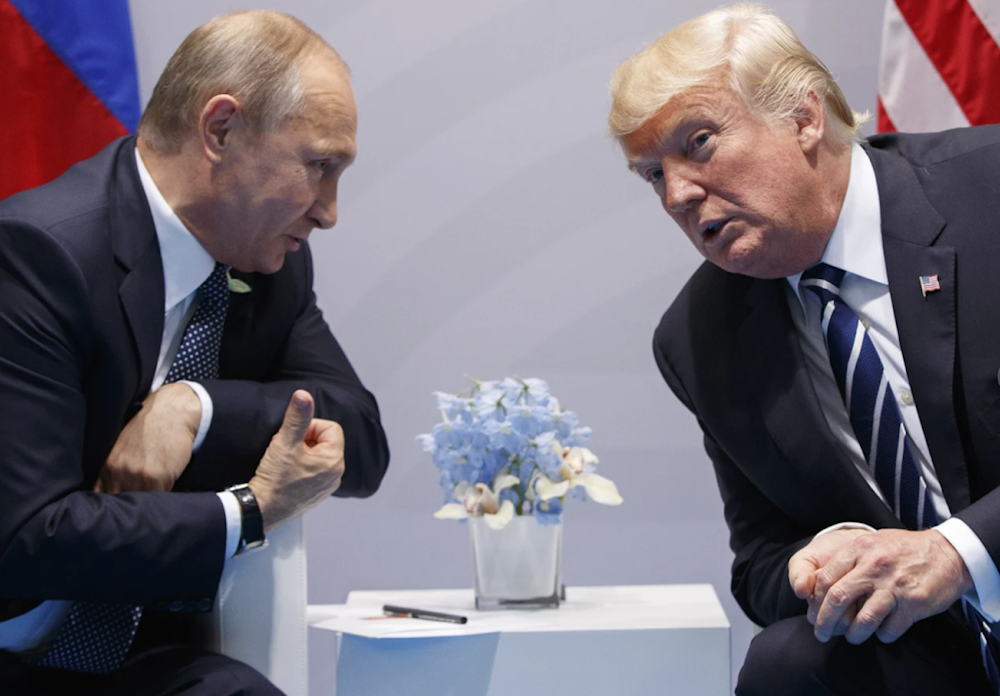Trump confirms 'land swap' talks with Putin at Ukraine war summit
Laying out his vision for a peace deal, Trump said it would involve compromise from both Ukraine and Russia.
-

US President Donald Trump meets with Russian President Vladimir Putin at the G20 Summit in Hamburg on July 7, 2017. (AP)
US President Donald Trump has confirmed that he and Russian President Vladimir Putin will discuss a potential “land swap” as part of efforts to end the war in Ukraine during their summit in Alaska on Friday.
At a White House press conference on Monday, Trump expressed frustration with Ukrainian President Volodymyr Zelensky for insisting that any deal involving territorial concessions must be approved through a national referendum.
“I was a little bothered by the fact that Zelensky was saying I have to get constitutional approval,” Trump said, citing that Zelensky has approval to "kill everybody," but needs approval for a land swap.
European diplomats have voiced concern over the lack of clarity from Washington about which Ukrainian territories Russia is demanding and under what terms a ceasefire would be negotiated. Some fear Trump may make risky concessions based on his perceived close relationship with Putin.
Laying out his vision for a peace deal, Trump said it would involve compromise from both sides. “We’re going to change the lines, the battle lines,” he said.
Tensions with allies ahead of the Alaska summit
Trump, increasingly impatient with how things have played out in the truce talks, has long said he does not see a ceasefire occurring until he meets Putin in person.
German Chancellor Friedrich Merz invited Trump on Monday to join emergency virtual talks with EU leaders and Zelensky on Wednesday, as European demands grow that the US president agree to red lines before Friday’s summit with Putin.
Trump said on Monday that he would also seek to arrange direct talks between Putin and Zelensky, while Merz’s office said in a statement that the virtual talks would focus on further pressuring Russia and preparations for possible peace negotiations and related issues of territorial claims.
Ahead of the upcoming EU meeting, Brussels’ top diplomat Kaja Kallas voiced cautious support for Trump’s position, saying, “President Trump is right to say that Russia must end its war against Ukraine. The United States has the power to force Russia to negotiate seriously.”
However, Kallas emphasized that any agreement struck between Washington and Moscow must also involve Ukraine and the European Union, warning that the issue directly impacts European security and calling it "a security issue for Ukraine and for the whole of Europe."
Polish Foreign Minister Radosław Sikorski echoed that stance, underlining Europe’s central role in the conflict as "paying for Ukraine to defend itself."
Pressure builds for broader sanctions
Merz spoke directly with President Trump on Sunday night, urging the US to impose additional economic sanctions on Russia ahead of Friday’s summit with Vladimir Putin. Merz also emphasized that any peace talks must include Zelensky, a stance complicated by Moscow’s refusal to recognize Zelensky’s government as legitimate, as his term as president has expired, and Zelensky has refused to hold elections since imposing martial law.
A joint statement issued Saturday by the leaders of France, Germany, Italy, Poland, the UK, Finland, and European Commission President Ursula von der Leyen backed Merz's view, stressing, “The path in Ukraine cannot be decided without Ukraine.” They also called on Trump to intensify pressure on Moscow.
Putin is expected to approach the Alaska summit confident in recent battlefield gains, aware of both Trump’s desire for a settlement and growing public fatigue in Ukraine. However, he also knows that failing to make a substantive offer could trigger harsher U.S. sanctions, long promised by Trump.
While Ukraine has accepted that it may not regain all territory lost in previous invasions, it remains strongly opposed to ceding more land without security guarantees or reciprocal concessions from Russia. European leaders insist that Ukraine must retain the freedom to build up its military and receive defense support from third countries, including NATO members.

 4 Min Read
4 Min Read









